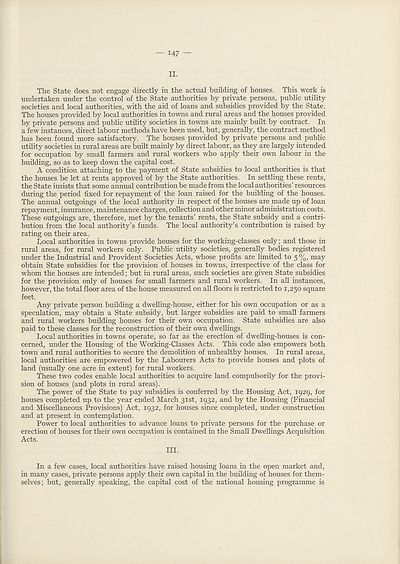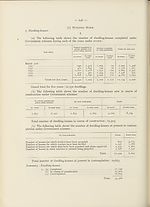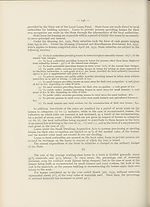Download files
Complete book:
Individual page:
Thumbnail gallery: Grid view | List view

147 —
II.
The State does not engage directly in the actual building of houses. This work is
undertaken under the control of the State authorities by private persons, public utility
societies and local authorities, with the aid of loans and subsidies provided by the State.
The houses provided by local authorities in towns and rural areas and the houses provided
by private persons and public utility societies in towns are mainly built by contract. In
a few instances, direct labour methods have been used, but, generally, the contract method
has been found more satisfactory. The houses provided by private persons and public
utility societies in rural areas are built mainly by direct labour, as they are largely intended
for occupation by small farmers and rural workers who apply their own labour in the
building, so as to keep down the capital cost.
A condition attaching to the payment of State subsidies to local authorities is that
the houses be let at rents approved of by the State authorities. In settling these rents,
the State insists that some annual contribution be made from the local authorities' resources
during the period fixed for repayment of the loan raised for the building of the houses.
The annual outgoings of the local authority in respect of the houses are made up of loan
repayment, insurance, maintenance charges, collection and other minor administration costs.
These outgoings are, therefore, met by the tenants’ rents, the State subsidy and a contri¬
bution from the local authority’s funds. The local authority’s contribution is raised by
rating on their area.
bocal authorities in towns provide houses for the working-classes only; and those in.
rural areas, for rural workers only. Public utility societies, generally bodies registered
under the Industrial and Provident Societies Acts, whose profits are limited to 5 %, may
obtain State subsidies for the provision of houses in towns, irrespective of the class for
whom the houses are intended; but in rural areas, such societies are given State subsidies
for the provision only of houses for small farmers and rural workers. In all instances,
however, the total floor area of the house measured on all floors is restricted to 1,250 square
feet.
Any private person building a dwelling-house, either for his own occupation or as a
speculation, may obtain a State subsidy, but larger subsidies are paid to small farmers
and rural workers building houses for their own occupation. State subsidies are also
paid to these classes for the reconstruction of their own dwellings.
bocal authorities in towns operate, so far as the erection of dwelling-houses is con¬
cerned, under the Housing of the Working-Classes Acts. This code also empowers both
town and rural authorities to secure the demolition of unhealthy houses. In rural areas,
local authorities are empowered by the babourers Acts to provide houses and plots of
land (usually one acre in extent) for rural workers.
These two codes enable local authorities to acquire land compulsorily for the provi¬
sion of houses (and plots in rural areas).
The power of the State to pay subsidies is conferred by the Housing Act, 1929, for
houses completed up to the year ended March 31st, 1932, and by the Housing (Financial
and Miscellaneous Provisions) Act, 1932, for houses since completed, under construction
and at present in contemplation.
Power to local authorities to advance loans to private persons for the purchase or
erection of houses for their own occupation is contained in the Small Dwellings Acquisition
Acts.
III.
In a few cases, local authorities have raised housing loans in the open market and,
in many cases, private persons apply their own capital in the building of houses for them¬
selves; but, generally speaking, the capital cost of the national housing programme is
II.
The State does not engage directly in the actual building of houses. This work is
undertaken under the control of the State authorities by private persons, public utility
societies and local authorities, with the aid of loans and subsidies provided by the State.
The houses provided by local authorities in towns and rural areas and the houses provided
by private persons and public utility societies in towns are mainly built by contract. In
a few instances, direct labour methods have been used, but, generally, the contract method
has been found more satisfactory. The houses provided by private persons and public
utility societies in rural areas are built mainly by direct labour, as they are largely intended
for occupation by small farmers and rural workers who apply their own labour in the
building, so as to keep down the capital cost.
A condition attaching to the payment of State subsidies to local authorities is that
the houses be let at rents approved of by the State authorities. In settling these rents,
the State insists that some annual contribution be made from the local authorities' resources
during the period fixed for repayment of the loan raised for the building of the houses.
The annual outgoings of the local authority in respect of the houses are made up of loan
repayment, insurance, maintenance charges, collection and other minor administration costs.
These outgoings are, therefore, met by the tenants’ rents, the State subsidy and a contri¬
bution from the local authority’s funds. The local authority’s contribution is raised by
rating on their area.
bocal authorities in towns provide houses for the working-classes only; and those in.
rural areas, for rural workers only. Public utility societies, generally bodies registered
under the Industrial and Provident Societies Acts, whose profits are limited to 5 %, may
obtain State subsidies for the provision of houses in towns, irrespective of the class for
whom the houses are intended; but in rural areas, such societies are given State subsidies
for the provision only of houses for small farmers and rural workers. In all instances,
however, the total floor area of the house measured on all floors is restricted to 1,250 square
feet.
Any private person building a dwelling-house, either for his own occupation or as a
speculation, may obtain a State subsidy, but larger subsidies are paid to small farmers
and rural workers building houses for their own occupation. State subsidies are also
paid to these classes for the reconstruction of their own dwellings.
bocal authorities in towns operate, so far as the erection of dwelling-houses is con¬
cerned, under the Housing of the Working-Classes Acts. This code also empowers both
town and rural authorities to secure the demolition of unhealthy houses. In rural areas,
local authorities are empowered by the babourers Acts to provide houses and plots of
land (usually one acre in extent) for rural workers.
These two codes enable local authorities to acquire land compulsorily for the provi¬
sion of houses (and plots in rural areas).
The power of the State to pay subsidies is conferred by the Housing Act, 1929, for
houses completed up to the year ended March 31st, 1932, and by the Housing (Financial
and Miscellaneous Provisions) Act, 1932, for houses since completed, under construction
and at present in contemplation.
Power to local authorities to advance loans to private persons for the purchase or
erection of houses for their own occupation is contained in the Small Dwellings Acquisition
Acts.
III.
In a few cases, local authorities have raised housing loans in the open market and,
in many cases, private persons apply their own capital in the building of houses for them¬
selves; but, generally speaking, the capital cost of the national housing programme is
Set display mode to:
![]() Universal Viewer |
Universal Viewer | ![]() Mirador |
Large image | Transcription
Mirador |
Large image | Transcription
Images and transcriptions on this page, including medium image downloads, may be used under the Creative Commons Attribution 4.0 International Licence unless otherwise stated. ![]()
| League of Nations > Communications and transit > Enquiry on national public works > (149) |
|---|
| Permanent URL | https://digital.nls.uk/195000287 |
|---|
| Shelfmark | LN.VIII |
|---|
| Description | Over 1,200 documents from the non-political organs of the League of Nations that dealt with health, disarmament, economic and financial matters for the duration of the League (1919-1945). Also online are statistical bulletins, essential facts, and an overview of the League by the first Secretary General, Sir Eric Drummond. These items are part of the Official Publications collection at the National Library of Scotland. |
|---|---|
| Additional NLS resources: |
|

